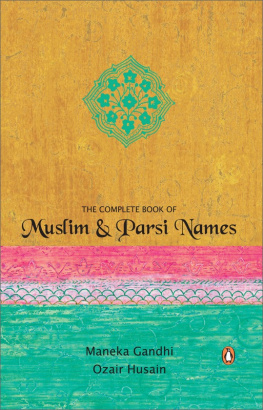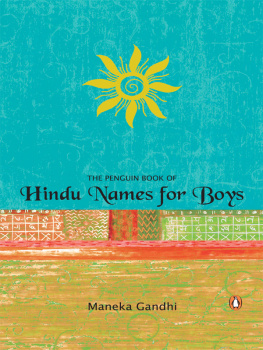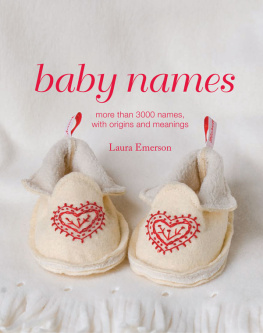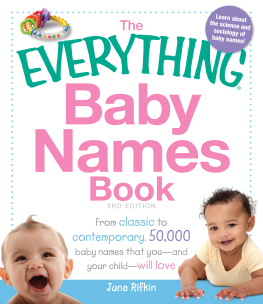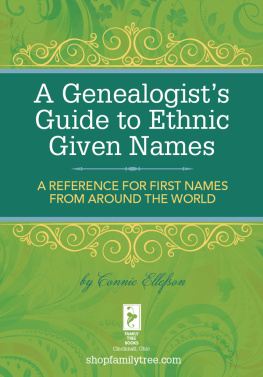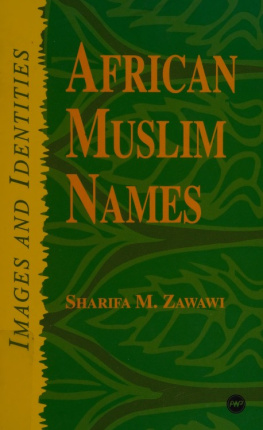On the day of Qayamat you will be called by your names and the names of your fathers. Therefore keep good names. The Prophet The Complete Book of Muslim and Parsi Names is a practical guide for choosing the perfect namefor your child. The result of several years ofresearch, it is an erudite and thoroughcompilation of approximately 30,000 namestaken from ten languages. With the actual and the construed meaningsand the history or mythology associated withthe name given against each entry,this is a precise and invaluable sourcebookfor scholars and lay readers alike. Cover illustration and design by Kavita C.
Dixit
PENGUIN BOOKS THE COMPLETE BOOK OF MUSLIM AND PARSI NAMES Maneka Gandhi was born on 26 August 1956 and was educated at Lawrence School, Sanawar. She was a magazine editor and columnist before she embarked on a career in politics. She was elected to Parliament in November 1989 and was later appointed Minister of State for Environment and Forests, a post she held till June 1991. Maneka Gandhi has authored
Sanjay Gandhi,
Brahmas Hair (a book on the mythology of Indian plants),
Rainbow and Other Stories and
The Penguin Book of Hindu Names. Her special interests include Indian mythology, animal welfare (she is the Managing Trustee of the Ruth Cowell Foundation, which runs the Sanjay Gandhi Animal Welfare Centre, Indias largest animal hospital and shelter) and issues related to environmental conservation. She lives in Delhi with her son, Feroze Varun. * * * Ozair Husain, the eldest son of the former Raja of Lorepur, was born on 22 December 1947 and was educated at La Martinere College, Lucknow and Aligarh Muslim University.
He has written several quiz books for children and has co-authored Animal Laws of India. His special interests include etymology, nature and history. He has one son, Saif Abbas.
THE COMPLETE BOOK OF
MUSLIM AND PARSI NAMES
MANEKA GANDHI OZAIR HUSAIN
PENGUIN BOOKS UK | Canada | Ireland | Australia
New Zealand | India | South Africa Penguin Books is part of the Penguin Random House group of companies whose addresses can be found at global.penguinrandomhouse.com.
This collection published 2016 Copyright Maneka Gandhi and Ozair Husain 1994, 2004 The moral right of the author has been asserted ISBN: 978-0-143-03184-0 This digital edition published in 2016.
To my mother,
Amteshwar Anand Maneka Gandhi
And mine,
Amatul Sughra Husain Ozair Husain
INTRODUCTION
Muhammad, meaning one who is praised, is the most commonly given name in the world.
To my mother,
Amteshwar Anand Maneka Gandhi
And mine,
Amatul Sughra Husain Ozair Husain
INTRODUCTION
Muhammad, meaning one who is praised, is the most commonly given name in the world.
According to a Hadis, Prophet Muhammad is supposed to have said, Whoever is named after me with the hope of being blessed, he will be blessed and will be in peace till the Day of Qayamat. According to the Mishkatu l Masabih, on the subject of names, the Prophet is supposed to have said, The best name in the sight of God are Abdullah (the servant of Allah), Abdur Rahman (servant of the merciful one.) The vilest name you can give a human being is Malikul-Amlak or king of kings because no one can be such but God Himself. Call your children after your prophet but the names God likes best are Abdullah (servant of Allah), Abdur Rahman (servant of the merciful one) and the next best are Haris (husbandman) and Hammam (high-minded). The worst of names is Harb (enmity) or Murah (bitterness). On the day of Qayamat you will be called by your names and the names of your fathers. Therefore keep good names.
Shuraih ibn Hani relates that his father came to the Prophet with his tribe and the Prophet heard them calling him Abul Hakam. When the Prophet said, Why do you call him so? Hakam, Ruler, is an attribute of God. And the prophet ordered him to call himself Abu Shuraih, the father of Shuraih, his eldest son. What is the ritual that accompanies the birth of a Muslim child? According to tradition, the child is bathed and bound in swaddling clothes. He is carried by the midwife to a waiting assembly of male relatives and friends. There the chief Maulawi or an Alim or respected elder recites the Azan (summons to prayer) in the infants right ear, and the Iqamah (which is the Azan with the addition of the words We are standing up for prayer) in the left ear: a custom which is founded on the example of Prophet Muhammad who is said to have done so at the birth of his grandson Hasan (Mishkat book xviii c.iv.2).
The Maulawi then chews a little date fruit and puts in into the infants mouth, a custom also founded upon the example of Muhammad (Mishkat book xviii c.iv.1). Alms are distributed, the amount of silver being of the same weight as the hair on the infants headthe childs head being shaved for this purpose (Mishkat book xviii c.iv.2) and Fatihas recited for the health and prosperity of the child. The name of the child should be given on the 7th day (Mishkat book xviii c.iv.2), the child being named after a member of the family, or after some saint venerated by the family, or some name suggested by the auspicious hour, the planet or the sign of the zodiac. The names usually fit into these categories:
a. a single name based on a mental or physical attribute or a natural phenomenon like birds, trees, planets, animals, clouds, sun, thunder, jewels, flowers, months, seasons or based on inventions like musical instruments or weapons, e.g. as the father or mother of someone, e.g. as the father or mother of someone, e.g.
Abu Bakr or father of a young camel or Ummul Banin or mother of sons c. as the son of someone, e.g. Ibn Alim or son of a learned man d. a combination of words, e.g. Imamuddin or leader of the religion e. trade or profession, e.g.
Najjar or carpenter f. the name of his birthplace, e.g. Madani or from Madina Names reflect the concerns of a race. Some of our observations while compiling this book are: Arabic names are not on natural phenomena like birds, flowers, mountains or rivers but on qualities. Of these qualities, the mental are less stressed and the physical are emphasizedmanly strength being the favourite. Persians, on the other hand, have far more names based on nature.
Some names are not given to children anymore as they are considered inauspicious. For instance, Shimar and Yazid may have had other meanings to begin with but they now mean reprobate, impious, wicked, infamous and merciless as these historical figures are the murderers of Imam Husain. Why have Parsi names been included? The religion of Zoroaster has nothing in common with Islam. But we have not approached the book from the religious but the etymological point of view. As we penetrated deeper into the roots of many Persian, Turkish, even Hindustani (or what we call Urdu) names, we found their origins in yet other languages that were used in that region prior to the Muslim invasions and the spread of Islam in that area. These languages, Avestan, Pazand, Pahlavi, Old Persian, were languages used in Parsa or Pars/Fars or ancient Iran.
In fact, the word Iran itself comes from the Avestan Airyana or path of the Aryans. The Arabs conquered Iran in the middle of the seventh century AD and Arabic became the official language of Iran. A new language emerged from the fusion of the old languages of the Iranians and that of the Arabs and that is generally termed Modern Persian or Persian. The word Parsi which was originally an ethnic term acquired a religious connotation and became restricted to the Zoroastrian residents of Pars or those who kept the traditional religion as distinguished from those Iranians who embraced Islam. We found it impossible to enumerate the royal genealogies or find historical and literary linkages without including the old languages. And since most of the old names were based on deities, festivals, months and old kings we had to include them.
Next page
